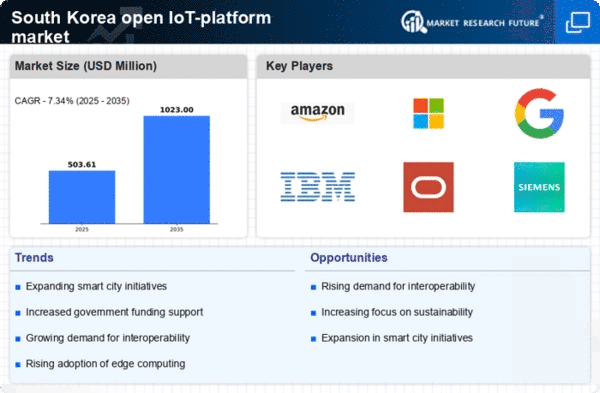Rising Demand for Smart Cities
The open iot-platform market in South Korea is experiencing a surge in demand driven by the government's commitment to developing smart cities. This initiative aims to enhance urban living through integrated technology solutions. As of 2025, the South Korean government has allocated approximately $1 billion to support smart city projects, which are expected to incorporate open IoT platforms for efficient resource management. The integration of these platforms facilitates real-time data collection and analysis, improving public services and infrastructure. This trend indicates a growing recognition of the potential benefits of open IoT solutions in urban environments, thereby propelling market growth.
Growing Adoption of 5G Technology
The rollout of 5G technology in South Korea is significantly impacting the open iot-platform market. With 5G networks offering enhanced speed and connectivity, the potential for real-time data processing and communication among IoT devices is greatly improved. As of November 2025, it is estimated that over 80% of urban areas in South Korea are equipped with 5G infrastructure, facilitating the deployment of open IoT platforms. This technological advancement allows for more sophisticated applications, such as autonomous vehicles and smart healthcare solutions, which are expected to proliferate in the coming years. The synergy between 5G and open IoT platforms is likely to create new market opportunities.
Increased Focus on Sustainability
Sustainability has become a pivotal concern in South Korea, influencing the open iot-platform market. The government has set ambitious targets to reduce carbon emissions by 40% by 2030, which necessitates the adoption of smart technologies. Open IoT platforms play a crucial role in monitoring and managing energy consumption across various sectors, including transportation and manufacturing. By leveraging these platforms, businesses can optimize their operations, leading to reduced waste and improved energy efficiency. This alignment with sustainability goals is likely to drive investment in open IoT solutions, as companies seek to comply with regulatory requirements and enhance their environmental credentials.
Supportive Regulatory Environment
The regulatory framework in South Korea is increasingly supportive of the open iot-platform market. The government has introduced various policies aimed at fostering innovation and ensuring data security within IoT ecosystems. For instance, the Personal Information Protection Act has been revised to accommodate the unique challenges posed by IoT technologies, promoting consumer trust. This regulatory support encourages businesses to invest in open IoT solutions, as they can operate within a clear legal framework. Furthermore, the government's initiatives to streamline compliance processes are likely to enhance market attractiveness, driving further adoption of open IoT platforms across different sectors.
Emergence of Industry-Specific Solutions
The open iot-platform market in South Korea is witnessing the emergence of tailored solutions for specific industries, such as healthcare, agriculture, and manufacturing. This trend is driven by the need for customized applications that address unique operational challenges. For example, in the healthcare sector, open IoT platforms are being utilized to monitor patient health remotely, improving care delivery. In agriculture, these platforms enable precision farming techniques, optimizing resource use and increasing yield. As industries recognize the benefits of specialized open IoT solutions, investment is likely to grow, further propelling the market forward. This diversification indicates a robust and evolving landscape for open IoT technologies.
















